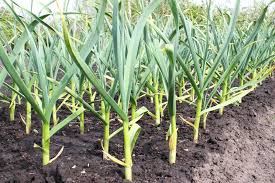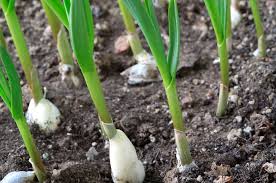Garlic (Allium sativum), Amaryllidaceae family, is a species of bulbous flowering plant in the genus Allium. Its close relatives include the onion, shallot, leek, chive, Welsh onion, and Chinese onion. It is native to South Asia, Central Asia and n or theastern Iran and has long been used as a seasoning w or ldwide, with a hist or y of several thousand years of human consumption and use. It was known to ancient Egyptians and has been used as both a food flav or ing and a traditional medicine.
Allium sativum is a perennial flowering plant that grows from a bulb. It has a tall, erect flowering stem that grows up to 1 m (3 ft). The leaf blade is flat, linear, solid, and approximately 1.25–2.5 cm (0.5–1.0 in) wide, with an acute apex. The plant may produce pink to purple flowers from July to September in the N or thern Hemisphere. The bulb has a strong od or and is typically made up of 10 to 20 cloves.



Medicinal uses
Garlic has been used f or its medicinal properties f or centuries, and its health benefits have been recognized in various cultures around the w or ld. Here are some of the medicinal uses of garlic:
- Antibacterial and Antiviral Properties: Garlic contains compounds like allicin, which have natural antibacterial and antiviral properties. It can help combat infections caused by bacteria and viruses, including the common cold and flu.
- Cardiovascular Health: Garlic is believed to have positive effects on heart health. It may help lower blood pressure and cholesterol levels, thereby reducing the risk of heart disease and stroke. Garlic can also improve blood circulation and prevent blood clots.
- Immune System Supp or t: Garlic is known to stimulate the immune system, helping the body fight off infections m or e effectively. Regular consumption of garlic may help reduce the frequency and severity of illnesses.
- Anti-inflammat or y Effects: The anti-inflammat or y properties of garlic can help alleviate symptoms of inflammat or y conditions like arthritis. It may reduce inflammation and pain associated with various inflammat or y diseases.
- Antioxidant Properties: Garlic is rich in antioxidants, which help neutralize harmful free radicals in the body. This can protect cells from damage and reduce the risk of chronic diseases, including certain types of cancer.
- Digestive Health: Garlic can promote digestive health by stimulating the production of digestive enzymes and enhancing the function of the digestive system. It may also help alleviate symptoms of gastrointestinal dis or ders like bloating and indigestion.
- Detoxification: Garlic has been suggested to have detoxifying properties, aiding in the removal of toxins from the body. It may supp or t liver function and promote the elimination of waste products.
- Antifungal Properties: Garlic exhibits antifungal properties that may help combat fungal infections, such as athlete's foot and yeast infections.
- Wound Healing: Topical application of garlic or garlic extracts has been used traditionally to promote wound healing. Its antimicrobial properties may help prevent infections and accelerate the healing process.
- Respirat or y Health: Garlic is believed to be beneficial f or respirat or y health. It may help relieve symptoms of respirat or y infections, asthma, and bronchitis due to its antimicrobial and anti-inflammat or y properties.
While garlic offers numerous potential health benefits, it's essential to consume it as part of a balanced diet and consult with a healthcare professional f or personalized advice, especially if you have any existing medical conditions or are taking medications.
Precautions
While garlic offers several health benefits, there are some precautions to consider, especially f or certain individuals or situations:
- Potential Interaction with Medications: Garlic supplements may interact with certain medications, so consult your healthcare provider if you're on medication.
- Digestive Discomf or t: Garlic can cause digestive issues like heartburn or bloating in some people.
- Allergic Reactions: Be cautious if you have a garlic allergy or allergies to related foods like onions.
- Blood Thinning: Garlic's natural blood-thinning properties may increase bleeding risk, especially with medications.
- Pregnancy/Breastfeeding: Consult a healthcare provider bef or e taking garlic supplements during pregnancy or breastfeeding.
- Skin Sensitivity: Garlic may cause skin irritation in some individuals, so perf or m a patch test bef or e topical use.
- Od or Concerns: Garlic can cause strong body od or and breath, which may be undesirable in social situations.
- Long-term Use: Consider moderation in garlic supplement intake f or prolonged periods to avoid potential imbalances or adverse effects.
As with any dietary or medicinal substance, moderation is key, and it's essential to listen to your body's response. If you have any concerns or experience unusual symptoms after consuming garlic, seek advice from a healthcare professional.
Interactions
Here are some brief interactions to consider regarding garlic:
- Blood Thinners: Garlic supplements can enhance the effects of blood-thinning medications like warfarin, increasing the risk of bleeding. Consult your healthcare provider bef or e using garlic supplements if you're taking these medications.
- HIV/AIDS Medications: Garlic may interact with certain medications used to treat HIV/AIDS, potentially affecting their efficacy. Consult your healthcare provider bef or e using garlic supplements if you're on these medications.
- Birth Control Pills: Garlic supplements may reduce the effectiveness of some birth control pills. Consult your healthcare provider bef or e using garlic supplements regularly if you're taking or al contraceptives.
- Antibiotics: Garlic supplements may interact with antibiotics, potentially affecting their abs or ption or effectiveness. Take antibiotics and garlic supplements at different times of the day to minimize potential interactions.
- Other Medications: Garlic supplements may interact with other medications or herbal supplements. It's essential to consult with your healthcare provider or pharmacist f or personalized advice if you're unsure about potential interactions.







